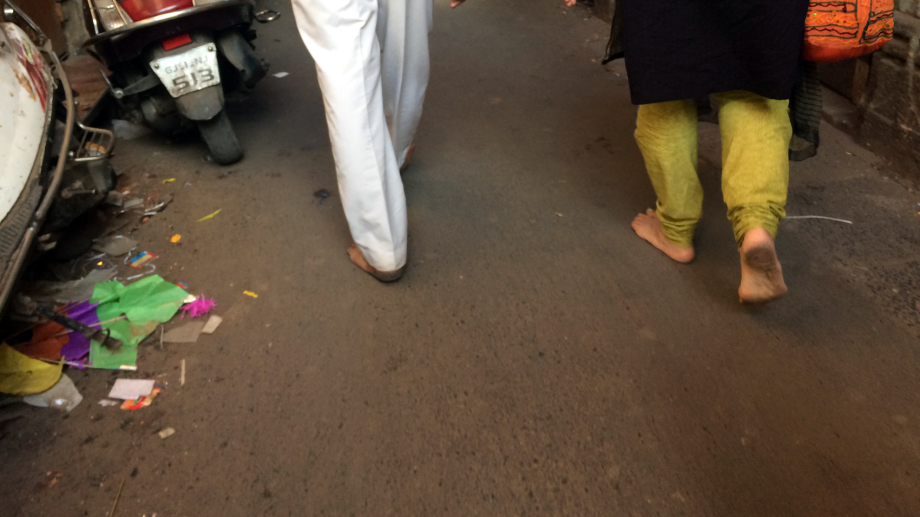Sow what you know. We had prayed these words during our morning Bible study, and now they tumbled around in my mind.
In Mark 4, Jesus talks about the farmer casting seed onto four soils. As my team of intrepid short-termers studied the passage, my mind filled with thoughts of seed sowing in this city and in the other unengaged cities we were visiting.
Sow what you know. The words drifted through my mind as I walked around the inside of an ornate, centuries-old mosque that was open for tourists.
“God, I don’t know the language spoken here,” I found myself praying.
Sow what you know.
Nearby stood a group of Muslim scholars.
I knew a few words in Arabic. So I greeted them, pointed to my heart, then pointed at theirs, and asked, “Tuqwa?” The meaning of the word suggests following God with piety and a clean heart.
They looked up and nodded yes.
“Malikut Allah?” I then asked, which means the Kingdom of God. This didn’t seem to register.
I surrendered to English and asked, “Do the people who pray here really follow God with tuqwa, their whole heart, or just to pray out of duty?”
One scholar’s face brightened at my question. He stepped forward, introduced himself as Muhammad, and invited me and my teammates to take a walk.
He gestured for us to follow him as he led us out a side door of the mosque, still in his bare feet, into a bustling market area. We followed obediently with our own bare feet, dodging trash, sewer, and dirt. I tried not to think about all the diseases that can be picked up when you walk barefoot through the streets of a hot, humid, crowded city.
We followed our new guide, stepping gingerly through the street. Where exactly is he taking us? I wondered. I glanced behind me at my teammates in tow. Their faces mirrored my own mix of apprehension, confusion, and eagerness to be thrust into adventure.
But Muhammad strode on. He was clearly taking his new role as neighborhood welcomer very seriously.
We walked through the preparations for a wedding and meandered past a courtyard where a group of covered women sat quietly around the covered body of a dead friend. We learned that they were in their third day of mourning.
Finally we arrived at an ancient building tucked away in the middle of the neighborhood. We stepped inside to view the caskets of a few saints, dead in their tombs.
After several minutes, Muhammad led us back out to the street.
Winding back through the market towards the mosque where we had started, the words came to my mind again: Sow what you know.
I thought, I know the name of Jesus, who is the Word Himself.
So I said to Muhammad, “I follow Isa al-Masih,” which means, Jesus the Messiah.
Muhammad nodded with knowing eyes—and I do believe his eyes actually twinkled, if that is something eyes can really do. With the wedding preparations and market now behind us, he stopped and said simply, “I too.”
In his broken English and a bit of Arabic, Muhammad explained that he prays in Jesus’ name every day. This was his dohah prayer. Unlike the ritualized prayers Muslims offer five times a day, dohah is intercession that can be prayed at any time. Muhammad told me that he studies the Bible in his home every Sunday with six or seven others.
I could hardly believe it. So I asked him in as many different ways as I could if he really loved and followed Jesus. Muhammad kept smiling and saying the same things.
Then he pointed to me, pointed to himself, and said in English, “You are my sister.” His eyes twinkled again.
I couldn’t wait to tell the long-term workers in this city and connect them with Muhammad. I felt a wave of thanksgiving that there were long-term workers in this city—a team of a couple of families—to encourage this man. (In a city we surveyed the next day, a few hours south, there were no field workers from any organization.)
Muhammad ushered our little band of travelers onto the front steps of the mosque. He laid out a flowered tablecloth across the steps and waved for us to sit.
“Chai,” he said, padding down the busy street and coming back with a tray of tiny paper cups filled with spicy sweet tea.
As we each sipped our chai, it felt like a sort of communion. An odd sort of communion, to be sure.
Behind us stood the mosque’s ancient columns and imams clad in long white robes. Taxis, motorcycles, livestock, and streams of people wandered by in front of us. Jumbled rows of shoes lined the landing just above us, left there by Muslims praying inside. I glanced at the stall of lingerie beside us, which Muhammad proudly told us belonged to his brother.
Jesus, what do you think of this? I wondered silently. Is this all even real?
I think I sensed Him say, “You’ve found the good soil. Thank you for sharing some messages of the Kingdom today. Enjoy your chai. I’ll do the rest.”
**Names and places have been changed for security.**
Original article: https://frontiersusa.org/sow-what-you-know-the-soil-of-unengaged-cities

